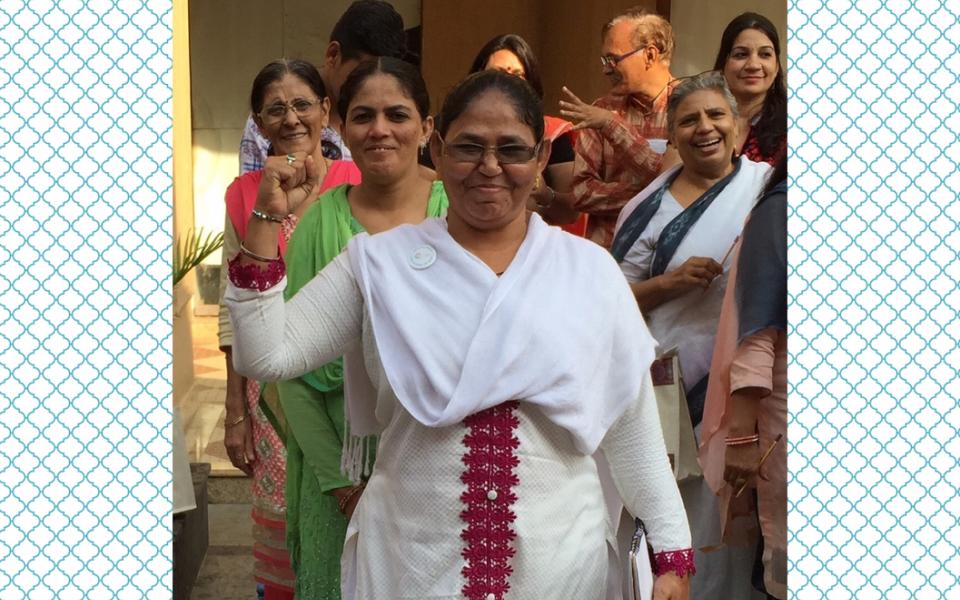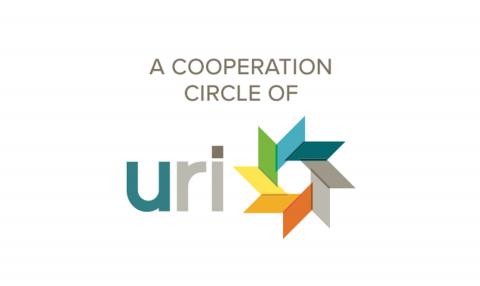
Interview with Nasim Mansuri, Convener of Roshini CC (a URI Cooperation Circle in Ahmedabad, India), and Sally Mahé. Nasim’s words translated by Qutub Kidwai, URI Regional Coordinator for India West Zone.
What in your background helped make you who you are?
I am the youngest in my family. I was always a tomboy and fearless as a child. I was only afraid of the dark and afraid of nothing else. My father understood and supported me. As I child I was allowed to play with boys. At age 17, I was married and had two daughters by the age of 20. I was harassed by my in-laws. I didn’t understand the marriage role. I was miserable and I left the marriage. I fell into sadness and didn’t know what to do. I was introduced to an NGO led by women. Then came the 2002 communal riots (genocide) in Gujurat. I rushed into the violence and mayhem to see how I could help the victims. I saw how vulnerable women and children were in this situation. My personal turmoil helped me deal with all the Muslims facing uncertainty and danger after these communal riots. Working with this cause helped lessen my pain.
What sparks your desire to do this work to empower women and to continue to do it year after year?
Even so many years after 2002, women are still displaced in the society. Women still suffer. A new generation is coming up and they must understand their situation. I want to help prepare these women to take responsibility for their lives. I want them to know they can have higher education. I want them to know that they can use laws and legal means to help themselves. I want justice for them.
What is hardest part of the work for you?
The mindset of the Muslim communities is entrenched. Communities lack motivation to change. They don’t take advantage of opportunities to better their situation.
How do you handle the difficulties and failures?
Yes, failures do come. I never stop my efforts! I know that all I have to give is what I have and I just keep going. For strength, I search inside myself. I go inside my own identity and my lifetime experience with pain and hardship. I take lessons from my own past. I gain strength from myself.
Please tell me about your recent project (Caravan) where you were a leader.
A major NGO in Delhi organized bus caravans to different parts of India to promote communal harmony and peace. One hundred fifty women (activists, teachers, etc.) went on a 10-day bus trip to different parts of India. I led a busload of women to East India. Buses stopped in villages to spread the message of interfaith harmony, give empowerment training to women and to counter hatred. They visited villages that were facing violence, both domestic and communal, and places where women and minorities were at risk.
Please tell me a story that shows your leadership.
There was a village where Caravan members said, “No, we don’t want to go because it’s too risky and the plans seem poorly coordinated. It is too dangerous for us to stop there.” I told them, “I will go myself then and address the people in this village.” I was going to go by myself. When the others heard me say this, they decided to go to the village. I felt it was my duty and responsibility to go. I didn’t want to let the people down who were expecting us. I trusted that the people would want to hear what we had to offer. The visit to this village was the best of all the visits! The people learned a lot and were very appreciative. The bus with its banners in the village was a very important symbol to the women that there were new ways they could be and live.
I felt fearless in this case. I trusted the people in the village and knew they needed this kind of support. I had to go. This helped me see the impact of Caravan visits and motivated me to organize another Caravan for villages throughout Gujarat.
What do you do to stay on track? Do you have a spiritual or a daily practice that you do?
I read the Koran every morning as soon as I wake up. I also call Qutub, I cry and cry. Qutub is there for me.
What would you say to advise other women who could be leaders?
Nasim: The fear in women must be tackled. Women must understand their identity is important. Women must take care of themselves. Women must understand their rightful role in society.
Qutub: I look for potential in women I meet. I sense their interior strength. A woman who is silent can be a hero more than we might think. I look for “gems in the rough” and give those women special attention to help them rise as leaders.
Thank you, Nasim and Qutub. I pray that you and the women you serve fulfill their aspirations and live in peace.
About the "Inner Voice of Leadership" series:
What inspires ordinary people to be bold? What sustains them? I wanted to dive deeper to explore the sources of strength alive within us. “Inner Voice of Leadership” is a series of interviews with URI Cooperation Circle leaders that seeks to uncover and share the personal deep streams of faith, courage and resilience that embolden people in our URI global community.
With gratitude to the Integral Leadership Program 2019, Integral Transformative Practice International (ITPI) that provided me with inspiration and guidance for this project.
With reverence for inner life and its outward expressions in each of our lives,
Sally Mahé,
Senior Consultant, URI
Read the full "Inner Voice of Leadership" series.

